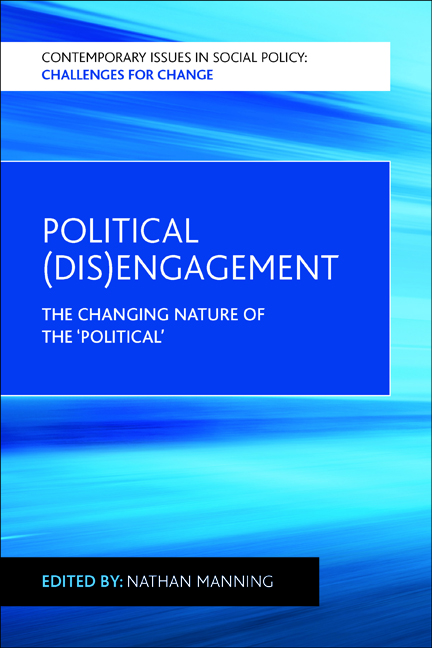eleven - Conclusion: politics as an open-ended process
Published online by Cambridge University Press: 11 March 2022
Summary
In this final chapter I attempt to draw together some of the insights revealed in the diverse multi-disciplinary and front-line contributions to this collection. One theme that seems to be shared by our authors is that politics is a dynamic, changing field. Politics in its fullness reflects many parts of social life, including: changing socio-cultural norms, generational change, the impact of new technologies, how we feel about the world around us and our relationship with various elites, the complex implications of global capitalism, patterns of migration and the multifarious ways in which social identity is embroiled in political (dis)engagement. Viewing politics in this way is important, as it is part of crediting citizens with the agency to create new and revive older understandings and practices of politics amid changing social conditions. It also helps to draw our attention to the importance of politics as a process, rather than focusing exclusively on the outcomes of political engagement or forms of political behaviour – the way we understand and go about politics is important.
The first section of the book provided three contrasting examples of the changing landscape of contemporary politics. In Chapter Two Michele Micheletti called upon us to interrogate the democratic qualities of different forms of participation. She used the terms ‘participation 1.0’ and ‘participation 2.0’ to refer to the ways in which citizenship expectations have opened up in recent years. These ideal types reflect a shift away from the ‘pre-packaged political home’ of ‘participation 1.0’, with its large and typically hierarchical institutions marshalling political participation, towards ‘participation 2.0’, which is less oriented to electoral politics and the nation-state, involves greater questioning of authority and emphasises do-it-yourself approaches and self-expression. Micheletti then poses some awkward and under-researched questions about the forms of participation that accompany different citizenship expectations. Rather than assuming that all participation is good participation, Micheletti invites us to consider the downside of participation and the implications of a possible value divide between citizens. Might different citizenship expectations work to exclude certain citizens, forms of participation and political questions/ideas?
- Type
- Chapter
- Information
- Political (Dis)EngagementThe Changing Nature of the 'Political', pp. 239 - 246Publisher: Bristol University PressPrint publication year: 2015

